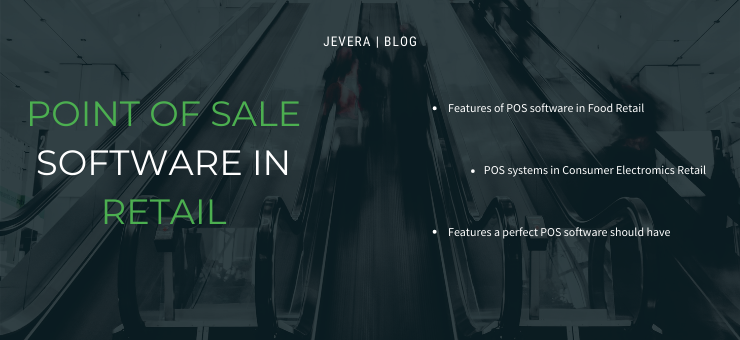What Is Special About POS Software in Retail
- Andrew Harper

- Oct 9, 2020
- 4 min read
Updated: Dec 7, 2021

The POS system is hugely needed. Both the smallest stores and the world's largest retail chains use it. Earlier, we explained why. But now, let's go more in-depth and focus on the Point of Sale software for retail stores. What functions do the systems perform for grocery and non-grocery sellers? Why are they so different? It is time to discover more.
Features of POS Software for Food Retail
Food retailers have a simple understanding of the POS system. For them, this is the cashier's workplace, whose task is carrying out settlement operations quickly and without mistakes. Regardless of the usage area, one more function of any Point of Sale is interaction with tax authorities. Thus, in grocery retail, it provides the state with performed operations details too. For such purposes, POS needs to support special fiscal equipment, like recorder scales, etc. Also, it may be integrated with different store hardware (like fridges).
The Point of Sale also helps to implement loyalty programs and get all the data about customer behavior to improve them. But still, such a function is not the main one.
Thus, this kind of sellers considers POS as a set of software and equipment that:
forms a cashier's workplace;
intended for prompt payment for goods;
provides tax authorities with information about transactions.
In other cases, the grocery Point of Sale serves as an additional interface for displaying data.

But what about types of POS systems for food retail? The majority of stores use Modular systems because they are much more convenient for cashiers. Also, choosing between cloud and on-premises points of sale, this segment prefers the last one. It's because the on-premises system can ensure the POS functions' performance, regardless of external factors (such as electricity troubles). Cloud technologies are handy in their way, but the loss of connection with the center anyway means the suspension of work.
Thus, in food retail, Point of Sale functions completely confirm its name. They are focused only on conducting sales procedures and interacting with tax authorities. Meanwhile, well-developed POS systems directly impact the growth of this industry. The best option for getting more benefits is to make full use of the passive system functions.
Consumer Electronics Retail Stores: Which POS Software Do They Use?
Despite the related field of activity, non-food retailers (particularly electronics sellers) put much more in their points of sale. To define what POS is in this case, it's worth considering its features first. Thus, here the system:
includes a countless number of processes;
enables cashiers to manage the goods (book it, search in other related stores or send some products, if it's needed);
has a complex document flow, which is not limited by checks, but also includes invoices, warranty cards, etc.;
not designed for speed, but versatility.
Differences in viewpoints are explained by the fact that non-food retail has a much smaller buyer flow and specific goods for sale. Thus, based on the above, the POS system ceases to be just a point of purchase and becomes a kind of interface for the company's ERP system. It can even be named a store management point for running the trade processes from one place.

The types of POS systems that electronics sellers choose are very similar to the preferences of grocery sellers. Usually, these are On-premises Point of Sales too. Anyway, the main distinction is that buyers can often notice Monoblock and Touch Screen Points of Sale in non-grocery stores. It's because of the relatively small number of clients per day and features of the system.
Despite the broad approach to POS usage, it's needed for non-food retailers to improve Point of Sale interaction with the marketing system. Expanding its capabilities will allow to:
speed-up staff training,
simplify POS processes,
manage self-service points efficiently.
Here due to the proper improvement, Point of Sale can become a full-fledged ecosystem that unites various elements.
How To Choose a Suitable POS Software
As for software getting, both types of retail proceed from business needs first. Sellers can choose a POS operating system (OS) in two ways:
Purchase of ready-made solutions, which are usually cheaper and don't require component changes. On the other hand, they cannot consider each specific company's features, since it's designed for numerous clients. Now the most popular POS software is SAP, Oracle, Netsuite products.
OS development for individual usage. In this case, the POS system turns out to be "hybrid" (combining different characteristics), but it is so effective since it considers all business features.
Сhoosing a software part for Point of Sale, a retailer needs to consider all the issues that POS can solve, analyze competitors' choices, and think about real future perspectives.
A Little More About Retail POS Systems
Thus, within one business niche, two contrasting approaches to the understanding of POS systems exist. It's just a cash register for grocery sellers capable of buyers serving and transmitting tax information to the relevant state authority.

For non-grocery ones, especially electronics retailers, POS performs much more functions and becomes a store managing system. In both cases, POS options are not used for 100%. More efficient retail business operation demands transforming a regular Point of Sale into a big ecosystem of interconnected processes.






